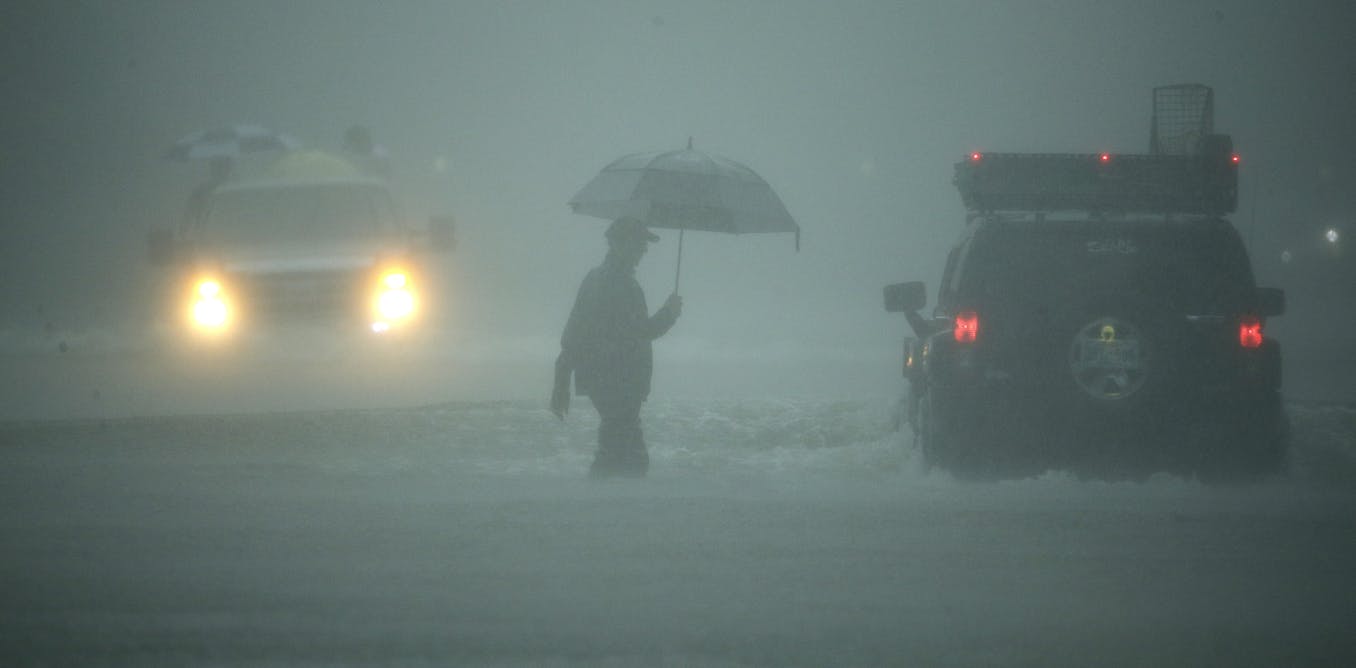I know you are excited, but before you run out to find your first treasure, we must be mindful about potential weather hazards to ensure we are Geocaching safely!
Visibility

Retrieved from www.gannett-cdn.com/ | SourceLinks to an external site. // Retrieved on October 25, 2021
How can you look for treasure if you cannot see? Not to mention, how will you get back? If you are going out in low visibility conditions, you may get lost or unknowingly wander into a dangerous location. In this case, the treasure is not the only thing you will be looking for on your trip! Low visibility conditions include heavy precipitation, fog (when a cloud touches the ground), dark nights, snowstorms, etc.
Tips to Avoid Hazard:
- Plan which caches you intend to look for and let someone know where you will go in advance in case you get lost.
- Treasure-hunt in a group and have someone stay behind before entering obscure locations.
- Bring fully-charged flashlights if going out in the dark.
- Do not go out when you cannot see clearly outside. Wait for a clear day.
Precipitation (Rain and Snow)

Retrieved from theconversation.com | SourceLinks to an external site. | Retrieved on October 25, 2021
As someone who's lived near Vancouver all my life, rain is not very intimidating (snow still kinda is, though) While it may not be as enjoyable as Geocaching in perfect weather, treasure-hunting in urban areas with light rain or snow is not harmful so long as you are properly dressed.
Aside: If you are Geocaching during the winter or in mountains, you should be aware of recent and future snowfall forecasts. Especially in the case of mountains, you should check for the risk of avalanches. Avalanches are large moving masses of snow that can be triggered by humans (ie. skiers or loud noises) if snow is in an unstable configuration. The impact of avalanches can kill, so you should be checked avalanche conditions before you go Geocaching in such areas.
In the case of heavy precipitation (ie. heavy rain or a blizzard), it is best to avoid Geocaching and/or going outside in general. Visibility and enjoyability can be extremely low in these conditions. Also, cold temperatures associated with winter and high elevations can put you at risk of hypothermia.
Tips to Avoid Hazard:
- Dressing in warm and waterproof clothing is best for rainy and snowy days.
- Drive slowly, being mindful that wet roads are slippery roads.
- Check avalanche conditions before caching in mountains.
- Check rain and snow forecasts for heavy rain or blizzards. If so, stay home.
Extreme Heat or Cold

Retrieved from medicaldaily.com | SourceLinks to an external site. | Retrieved on October 25, 2021
It goes without saying that being outside when it is too hot or cold can be quite uncomfortable. While true for all weather-related hazards, extreme temperatures are what call for preparation the most.
Extreme Cold:
"Brrr..." That is, Brrr-ing a jacket! Normal functioning body temperature sits around 37°. Falling below 35°C leads to hypothermia, where other organs such as your heart cannot function properly. If a person suffers from hypothermia for too long, it can lead to the failure of vital organs and, eventually, death. Don't let an innocent treasure hunt become deadly!
Tips to Avoid Hazard:
- Check weather forecasts for temperatures and dress accordingly.
- Wear warm layers and waterproof outer clothing.
- Take frequent breaks
- Return indoors or your vehicle to warm up
- Bring the right equipment
- Consider snow boots or snowshoes if necessary. Bring extra clothing just in case.
- Use snow tires or chains if driving to your caches.
Extreme Heat
If someone in the heat is dizzy or sweating excessively, they may be suffering from heat exhaustion. Summer Geocachers may find themselves suffering from heat exhaustion if searching out in the sun for too long. While heat exhaustion in itself is not fatal, it could develop into a heat stroke if left untreated. Having a body temperature of above 40°C gives rise to heatstroke, in which vital organs can be damaged.
To avoid these heat-related conditions, be sure to bring a lot of water and stay hydrated. If you are geocaching in a more remote location, it is advisable to bring a filter and/or some iodine in case of emergency situations. You should apply sunscreen to both the face and body to avoid sunburn.
Tips to Avoid Hazard:
- Check weather forecasts for temperatures and dress accordingly
- Wear light clothing (ex. shorts, t-shirts, tank tops)
- Take frequent breaks
- Find shaded areas to rest
- Bring the right equipment
- Wear sunscreen and bring an ample supply of water. Reapply sunscreen every few hours.
- Enjoy cool foods and drinks during your treasure hunt!
 icons at the top right corner of the subsection.
icons at the top right corner of the subsection.